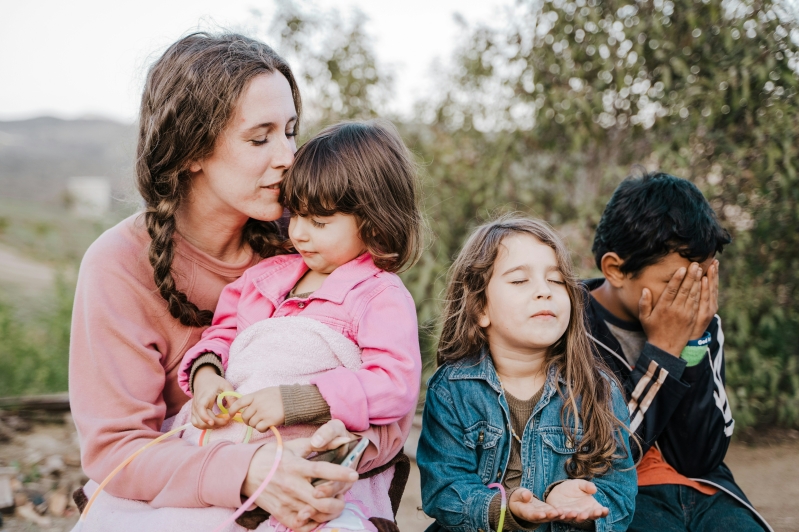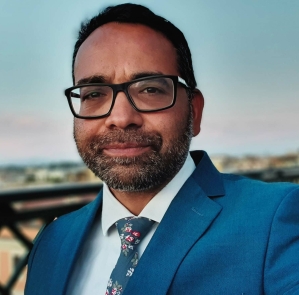
A leading evangelical advocate for children and government advisor calls out political parties for ignoring tens of thousands of vulnerable children in need of foster and adoption parents in their manifestos for the upcoming U.K. General Election 2024. Sharing about his own experience as as a foster and adoptive parent, he calls on evangelical churches to step up at this time of need.
Records show 84,000 ‘looked after’ children under the care of local authorities in England because parents are unable to have them for different reasons, as revealed by latest U.K. government figures up to March 2023.
Dr. Krish Kandiah, founder of Home For Good, a charity providing homes for children needing fostering and adoption, and now director of the Sanctuary Foundation supporting refugees, has called on “a wave of compassion and hospitality” to be unleashed by evangelical churches and other parties interested in the welfare of these youngsters.
The reasons for the 84,000 children being put into the care of local authorities are various but “it’s been growing”, Kandiah, who lives in Oxfordshire but works in London, said. Forms of abuse, alcohol and substance addiction can be typical issues as to why the youngsters need to be rehomed. But he said there simply are not enough foster families currently available to provide those homes and “the support mechanism is not always there as it should be.”
“I know it’s possible to recruit large numbers of foster carers but the difficulty is that the two main British political parties, Conservatives and Labour, do not offer solutions in their space. For the upcoming General Election, the Conservative manifesto makes no mention of it, and the Labour party says it will work with local authorities but that’s not big news because there’s a statutory obligation to do so anyway. Where’s the political vision for working with these vulnerable children in our society?

“As God looks at our world, he pays special attention to these children who are too vulnerable to live with their birth families. There’s a huge need and I would love to see the newly elected government [on July 4] show great ambition for these children and they need to know that civil society is ready to respond, we have seen that on so many occasions. So I am hoping that whoever wins the election will take responsibility for these 84,000 kids.”
The next government, of whatever political persuasion, “needs to realize this is their job” to look after these children, added Kandiah.
“They have a legal responsibility as the corporate parent and they can’t let the system carry on as it is. Many local authorities are now employing children’s homes and this wasn’t in their children’s care plans, so they are using an inferior method of looking after them as they can’t recruit enough foster carers.”
Provision for children with special education needs is also “under incredible stress,” said Kandiah, who was chairman of the Adoption and Special Guardianship Leadership Board from 2019 to 2021, advising the U.K. Government. This week local authorities reported a £1 billlion [$1,272 billion USD] deficit in funding for the support of children needing special educational support.
“Neither of the main political parties has provided forward-looking solutions in their manifestos for the election. If we don’t fix this issue it will cost the government money in the long term but more importantly, the kids won’t be getting the support they need.”
“If they can do it, why not us?”
Kandiah, who was awarded an Officer of the Order of the British Empire last year for his work among refugees, is a foster parent himself, with his wife Miriam. The couple have fostered 30 youngsters since 2006, including three long term fostered and adopted children. They also share three birth children.
“I have just found fostering to be one of the most amazing things our family has done. It’s been fantastic for our [birth] children as they have grown up, to be part of our team supporting children who have had a difficult start in life. It’s not without heartbreaks and challenges but then again, there are few things God calls us to do which are without a challenge.
“So if you get a chance to foster, please do it. It’s fantastic to do! If you are married it’s great to have someone come alongside to help you, but I’ve also met some amazing single foster parents. I think people should rule themselves in, rather than rule themselves out.”
Three “things” inspired the couple in their faith in Jesus to become foster and adoption parents.
“The first thing is Bible scripture. It was a wake-up moment when I realized how central to God’s heart caring for the widow and orphan is. James 1:27 says, ‘Religion that is pure and undefiled before God, the Father, is this: to visit orphans and widows in their affliction, and to keep oneself unstained from the world.’
“But it’s not just one-off verses, throughout the 66 books of the Bible the picture of God is a champion for the vulnerable and marginalized. So scripture was hugely significant in our decision to foster and adopt children.
“Secondly, when we were in our 30s we had friends in their 60s who became foster parents for the first time. And we thought if they can do it, why not us?
“Thirdly is the statistics. The number of children in care has been growing and fostering seems to have fallen off in terms of support. If these children don’t get the help they need, with established families, they can end up exploited by criminals or homeless. It’s a huge challenge and we thought this is something we can do to make a difference.”
Churches are a central part of the solution
Churches have a “crucial part to play” in solving the problem of children needing fostering and adoption. He urged churches to contact the Home For Good charity to find out more about how to help needy children find a home.
“It is because I believe that churches are an essential part of the response that I set up the Home For Good charity,” said Kandiah. He said his own church had been a tremendous support but generally speaking, communications needed to improve between local authorities and Christians on the issue of fostering.
Kandiah gave an example that if a Christian answers a foster parent assessment interview question, “why do you want to become a foster parent?” with the answer “because God told me to” it can look, from the point of view of the interviewer, as though “they might think you are hearing voices” and “so we need to think about language used. The point of a fostering assessment is to look at whether you can offer a safe place for a vulnerable child to be placed.”
“Sometimes the church needs literacy on how to work better with government systems and local authorities. I think there are some fantastic examples of churches doing amazing work but tremendous opportunities to do even more.”
Kandiah referred to the inspiring true story of a Catholic church in a small town in Texas, U.S. called Possum Trot. A new movie ‘Sound of Hope’ is being released next month (July) tells the story how 22 families in the church adopted 77 children. “Stories like that inspire us,” commented Kandiah.
The fostering expert said “more inspiration, more training” was needed to help potential foster parents step forward. He opined that foster carers need both information and help in supporting children, such as those with special education needs. He and his wife, for example, are part of the ‘Mockingbird’ programme, a relationship building scheme based on a satellite model involving six to 10 foster families.
Kandiah also called for “a reboot” in the way social workers worked with foster families. He has noticed a change in recent months whereby the social workers “are more bureaucratic and give less pastoral support.”
Independent Foster Carer Survey reveals dire situation for children
Meanwhile, advocacy group FosterWiki founded by Sarah Anderson, psychotherapist and a foster carer for 15 years, has issued its 2024 Independent Foster Carers Survey with 2,500 respondents. Details in the report are heartbreaking and reveal a situation that is “dire” for the children.
“A recurring theme throughout [the survey] was a desperate cry for help from the frontline, not only for the foster carers themselves but for the children they care for, underscoring the remarkable resilience of foster carers in the face of immense adverse challenges,” stated Anderson, in an introduction to the report findings.
“When we surveyed the significant number of foster carers considering resignation, the results were striking. The majority cited feeling unvalued, experiencing burnout and exhaustion, and facing mental health challenges.
“They also reported a lack of breaks, insufficient support, especially during weekends and holidays, and inadequate financial compensation. Additional concerns included the impact on their own families, fear of allegations, bullying, and the grief and loss when a child moves on.”
78 percent of carers reported mental health issues due to their fostering roles “with many suffering in silence for fear of repercussions.” Most of the written comments received blamed “systemic issues” rather than problems with the children themselves.
80 percent reported fears of allegations affecting their mental health and hampering their abilities to work with even more (85 per cent) saying any such allegations would be “not handled fairly, justly, or in a balanced way.”
The foster carers also highlighted that many fostering services failed to meet statutory requirements, in their feedback.
“We now have empirical evidence supporting our long-standing concerns, which have often been dismissed as complaints from a few unhappy carers,” wrote Anderson, who opined: “The same handpicked foster carers are repeatedly presented to the government, perpetuating a misleadingly positive narrative.”
Anderson presented “the big question” as “how long will this be allowed to continue?” She called for children to be put first “beyond mere rhetoric.”
“Let us set aside agendas, profits, and politics and place the children back at the heart of the system.”





